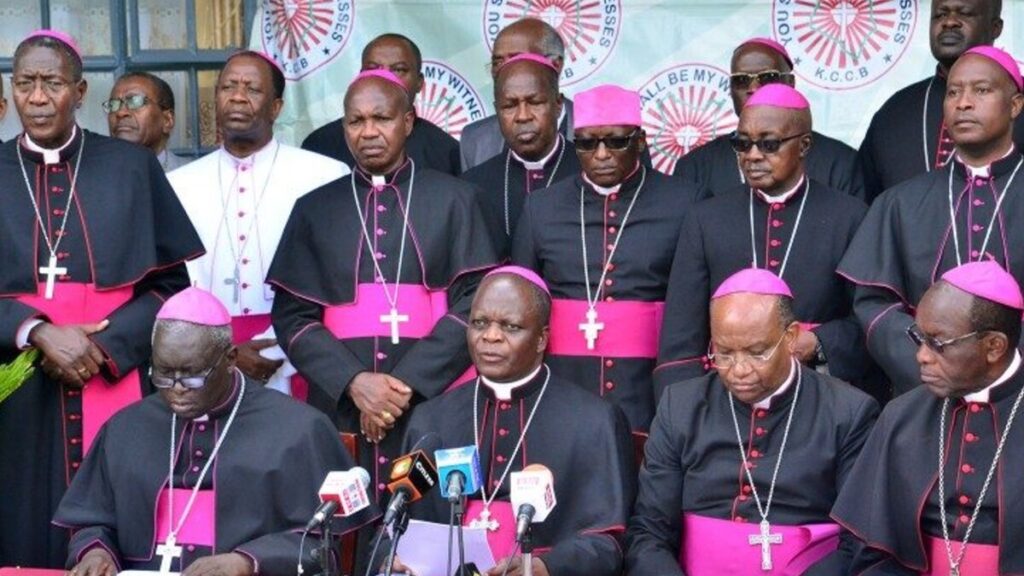The Kenya Conference of Catholic Bishops (KCCB) has delivered a harsh rebuke to President William Ruto’s government. Their criticism focuses on unfulfilled promises and mounting security concerns across the nation.
In a powerful statement released yesterday, KCCB Chairman Archbishop Maurice Muhatia accused the government of fostering a “culture of lies”. The Archbishop pointed to numerous broken promises, particularly in the healthcare sector.

Catholic Bishops addressing a press conference on November 14, 2024.Courtesy photo
The bishops expressed deep frustration over the government’s failure to honour its commitments. Of particular concern is the delayed National Health Insurance Fund (NHIF) payments to faith-based hospitals throughout Kenya.
“Our healthcare facilities are struggling to provide essential services due to these delays,” Archbishop Muhatia stated. He emphasised how this negligence directly affects ordinary Kenyans seeking medical care.
Moreover, the Catholic leaders raised alarm over the deteriorating security situation in the country. They highlighted a disturbing trend of abductions, disappearances, and extrajudicial killings affecting Kenyan citizens.
The bishops specifically referenced the recent Gen Z protests in June 2024. During these demonstrations, numerous young people were reportedly abducted or injured while protesting against government corruption.
“The youth of our nation deserve to be heard, not silenced,” declared Archbishop Muhatia. He called for immediate government action to address these serious human rights violations.
The KCCB also took aim at the increasing political divisions within the government. These internal conflicts, they argued, have created deep rifts in Kenyan society and eroded public confidence.
Corruption emerged as another major concern in the bishops’ statement. They accused elected officials of abandoning their constitutional responsibilities to pursue personal interests.
“Public servants must remember their primary duty is to serve the people,” the Archbishop emphasised. He urged government officials to prioritise national interests over individual gain.
The church leaders also addressed Kenya’s economic challenges. They described the current tax system as “prohibitive and burdensome” for ordinary citizens.
Furthermore, the bishops criticised recent tax increases. They viewed these hikes as an attempt to reintroduce elements of the controversial Finance Bill 2024 through alternative means.
The KCCB called for more effective use of tax revenue. They urged the government to focus on essential services like healthcare, education, and job creation.
“The burden on ordinary Kenyans has become unbearable,” stated Archbishop Muhatia. He emphasised the need for immediate economic reforms to ease public suffering.
The bishops’ stance represents a significant challenge to the government’s authority. Their influence could substantially impact public opinion and political discourse in Kenya.
This confrontation marks a crucial moment in church-state relations. The government’s response will likely determine the future relationship between these two influential institutions.
Political analysts view this as a potential turning point in Kenya’s governance. The bishops’ criticism could prompt necessary reforms or lead to increased tensions.
The KCCB’s statement has already generated substantial public discussion. Many Kenyans have expressed support for the bishops’ bold stance on social media platforms.
As the situation unfolds, all eyes are on the government’s response. The coming weeks will reveal whether this criticism leads to meaningful dialogue or further conflict.
The bishops concluded their statement by calling for immediate action. They urged the government to address these concerns for the welfare of all Kenyans.
“We cannot remain silent while our people suffer,” Archbishop Muhatia declared. His words reflect the KCCB’s commitment to advocating for social justice.
This confrontation highlights the growing tensions between religious leaders and state authorities. Its resolution could significantly impact Kenya’s political landscape.



















